The President of the United States, Donald Trump, has reaffirmed that he will withdraw U.S. troops from Syria and Afghanistan but not from Iraq, and reinforced his insinuations that a military attack on Venezuela is still on the table, with a view to overthrowing the president of that South American country, Nicolas Maduro.
To be sure, the withdrawal of U.S. troops from Syria implies the recognition of the defeat of the plot that began back in 2011 to depose the legitimate President of that Arab nation, Bashar Al Assad, and "defeat" is not a very pleasant word in the White House halls.
Mr. Trump might think that there is no better compensation for a defeat than a victory in a more agreeable scenario, and perhaps that explains his aggressiveness against Venezuela.
Even though there are no military preparations for a military attack against Venezuela, at least not openly, the Pentagon already has the OK from subservient governments in the area, ready to serve as spearheads of an attack of that kind, among them some that have a border with Venezuela.
Hoping for a swift victory that would heal the wounds of the U.S. defeat in Syria, the loot in Venezuela is highly desired by Mr. Trump and his cohorts, beginning with the largest oil and natural gas reserves in the world, the geo-strategic position of Venezuela, both towards South America, Central America and the Caribbean, as well as its huge deposits of gold, silver, diamonds and hydraulic reserves that water the mouth of the U.S. investors.
But the consequences of such a war are unpredictable and without any doubt the first ones that would pay the prize of such aggression will be Washington’s allies.
Mr. Trump's calculations do not contemplate the almost certain regionalization of the conflict, the waves of refugees that will collapse services and businesses in the area nor the response from China and Russia, nations that maintain their support for the current democratic Venezuelan government.
Is Donald Trump looking for a war in Latin America?

Related Articles
Commentaries
MAKE A COMMENT
All fields requiredMore Views
- Cuban delegation calls on rich countries at ECLAC to fulfill development aid
- New York doctor fired for rejecting Zionist propaganda, defending resistance
- Public health cooperation improves services in Pinar del Río
- Cubans to take part in Panamerican Junior Judo Cup
- Cuban delegation attends World Telecommunications Conference

